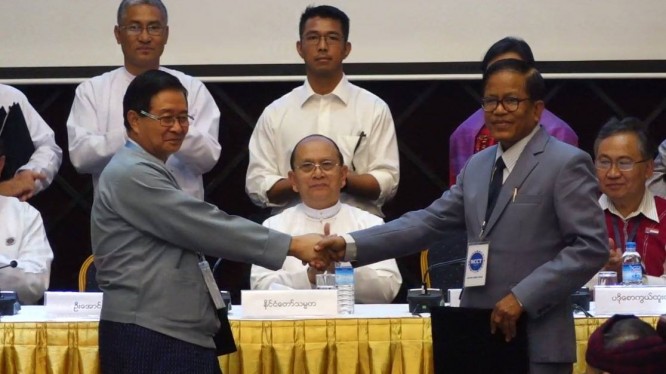U Thein Sein’s military government finds itself in a tight corner following the decisions adopted by ethnic armed groups during talks at the Karen National Union (KNU) headquarters of Lawkheela from 2– 9 June.
Commander-in-chief Min Aung Hlaing lambasted the ethnic groups for not giving in so easily when signing the Nationwide Ceasefire Agreement (NCA) that the government drafted to its own satisfaction.

The government not only failed to realise its expectations, but to make matters worse, took a sucker punch. It is now in a helpless position where it can neither move forward nor back off.
The political step taken by the ethnic armed groups at Lawkheela is rather spectacular because it does not mean they are rejecting the draft NCA (originally agreed between the ethnic groups and government on 31 March), but that they are going back to the table to further negotiate the amendments they wanted added to the draft.
The time now is different from Gen. Ne Win’s era; the current junta is incapable of standing on its own two feet either militarily or economically. Not only does it have to rely on foreign countries for weapons, business investment and development aid, but it has also failed to generate sufficient income from exports.
The earlier illusions about a seemingly stable Burmese currency have disappeared. Prices for oil, cars, medicine and other imported goods are steadily rising, leading to a hike in general commodity prices.
This, combined with the government’s failure to generate enough income from exports, raises the real threat of a mass uprising.
Naypyidaw has just one way out – to get the ethnic armed groups to sign an NCA, which it will then use as leverage to attract international investments and development aid, all the while extracting and selling the ethnic regions’ natural resources. There is no other way.
[related]
It would be costly for the junta to ignore the Lawkheela decisions, abandon the peace talks or resort to crushing any armed group that refuses to sign the NCA. Doing so would close all opportunity of an economic way out. All the financial assistance – millions of dollars provided by the EU, Norway and Japan – will dry up. There is also the risk of a mass uprising combined with intensified ethnic resistance.
On the other hand, the new delegation tasked by the Nationwide Ceasefire Coordination Team (NCCT) to engage in the negotiations is not being led by the KNU’s Mutu Say Poe, who is very cosy with the government, but rather by KNU Vice-president Naw Zipporah Sein who has a strong political stance.
One of the conditions deemed unpalatable by the government is the NCCT’s insistence that the ceasefire accord involves signatures from all 16 member organisations, including the Kokang, Ta-ang and Arakan armies that the government had previously rejected from the peace deal.
U Thein Sein, who previously boasted about how the Tatmadaw [Burmese army] had crushed the Kokang’s Myanmar National Democratic Alliance Army in just three days, became suddenly silent when the Kokang fought back. Today there is no sign of victory for the government forces after some five months of fighting.
Moreover, the armed groups’ suggestion that the management of land and natural resources is on the agenda in the post-ceasefire period has hit a raw nerve with the junta. If this is included in the NCA, it will effectively prevent the government and Burmese military from single-handedly making decisions and dominating those resources.
The NCCT also wants the NCA to be witnessed by representatives of seven foreign nations, effectively preventing either side from violating the terms and conditions of the agreement.
In conclusion, the decisions adopted by the ethnic armed groups in Lawkheela are realistic, reasonable and objective. Together, these armed groups have avoided falling into the junta’s trap and have taken a significant step towards a genuine peace.
Whether they will reach that goal or not, we’ll have to wait and see.
Aung Htoo, formerly head of Burma Lawyers’ Council, is a human rights lawyer who is a founder member of Legal Aid Network.
You can read a full transcript of this essay in Burmese language HERE



